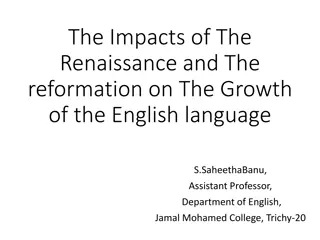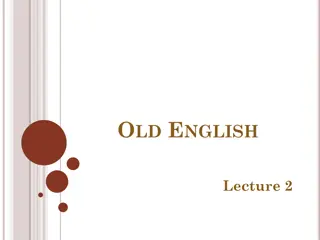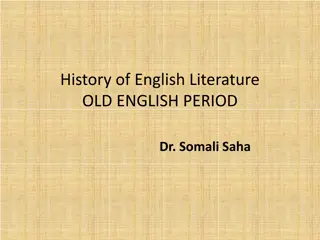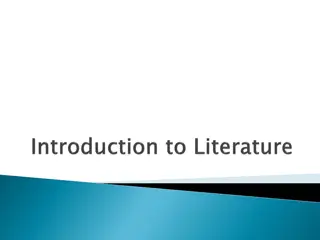Celtic Influence on Old English Language Evolution
The Old English language was influenced by the Celtic, Roman, and Scandinavian languages during its early years in England. The assimilation of Celtic words into Old English can be seen in place-names and vocabulary. Various cities and natural features in England bear traces of Celtic influence, showcasing the lasting impact of Celtic language on the evolution of Old English.
Download Presentation

Please find below an Image/Link to download the presentation.
The content on the website is provided AS IS for your information and personal use only. It may not be sold, licensed, or shared on other websites without obtaining consent from the author.If you encounter any issues during the download, it is possible that the publisher has removed the file from their server.
You are allowed to download the files provided on this website for personal or commercial use, subject to the condition that they are used lawfully. All files are the property of their respective owners.
The content on the website is provided AS IS for your information and personal use only. It may not be sold, licensed, or shared on other websites without obtaining consent from the author.
E N D
Presentation Transcript
CH.ARUNA ASSOCIATE PROFESSOR OF ENGLISH HINDU COLLEGE GUNTUR
1.The Celtic Influence 2.Latin Influence 3.Scandinavian Influence: The Viking Age
In the course of the first 700 years of its existence in England it was brought into contact with at least three other languages, the languages of the Celts, the Romans, and the Scandinavians. From each of these contacts it shows certain effects, especially additions to its vocabulary.
We should find in the Old English vocabulary numerous instances of words that the Anglo- Saxons heard in the speech of the native population and adopted. For it is apparent that the Celts were by no means exterminated except in certain areas, and that in most of England large numbers of them were gradually assimilated into the new culture. The evidence of the place-names in this region lends support the Celtic influence.
Such evidence as there is survives chiefly in place-names. The kingdom of Kent, for example, owes its name to the Celtic word Canti or Cantion, the meaning of which is unknown, while the two ancient Northumbrian kingdoms of Deira and Bernicia derive their designations from Celtic tribal names.
Devonshire contains in the first element the tribal name Dumnonii, Cornwall means the Cornubian Welsh , and the former country Cumberland (now part of Cumbria) is the land of the Cymry or Britons .
Celtic Place-Names and Other Loanwords The name London itself, although the origin of the word is somewhat uncertain, most likely goes back to a Celtic designation. The first syllable of Winchester, Salisbury, Exeter, Gloucester, Worceste r, Lichfield, and a score of other names of cities is traceable to a Celtic source, and the earlier name of Canterbury (Durovernum) is originally Celtic. But it is in the names of rivers and hills and places in proximity to these natural features that the greatest number of Celtic names survive. Thus the Thames is a Celtic river name, and various Celtic words for river or water are preserved in the names Avon, Exe, Esk, Usk, Dover, and Wye.
Celtic Place-Names and Other Loanwords Outside of place-names, however, the influence of Celtic upon the English language is almost negligible. Not more than a score of words in Old English can be traced with reasonable probability to a Celtic source. Within this small number it is possible to distinguish two groups: (1)those that the Anglo Saxons learned through everyday contact with the natives, and (2)those that were introduced by the Irish missionaries in the north. The former were transmitted orally and were of popular character; the latter were connected with religious activities and were more or less learned.
Celtic Place-Names and Other Loanwords As a result of their activity the words ancor (hermit), (magician), cine (agathering of parchment leaves), cross, clugge (bell), gabolrind (compass), mind (diadem), and perhaps cursian (to curse), came into at least partial use in Old English. (history) and
Latin was not the language of a conquered people. It was the language of a highly regarded civilization, one from which the Anglo-Saxons wanted to learn.
Thus there occurred in Old English, as in most of the Germanic languages, a change known as i-umlaut. This change affected certain accented vowels and diphthongs (oe, and when they were followed in the next syllable by an or j. Under such circumstances oe and became , and became The diphthongs ) became became later and became Three Latin Influences on Old English
The first Latin words to find their way into the English language owe their adoption to the early contact between the Romans and the Germanic tribes on the continent. In general, if we are surprised at the number of words acquired from the Romans at so early a date by the Germanic tribes that came to England, we can see nevertheless that the words were such as they would be likely to borrow and such as reflect in a very reasonable way the relations that existed between the two peoples.
It would be hardly too much to say that not five words outside of a few elements found in place-names can be really proved to owe their presence in English to the Roman occupation of Britain. It is probable that the use of Latin as a spoken language did not long survive the end of Roman rule in the island and that such vestiges as remained for a time were lost in the disorders that accompanied the Germanic invasions.
At best, however, the Latin influence of the First Period remains much the slightest of all the influences that Old English owed to contact with Roman civilization. Latin through Celtic Transmission (Latin Influence of the First Period)
The greatest influence of Latin upon Old English was occasioned by the conversion of Britain to Roman Christianity beginning in 597. There was in the kingdom of Kent, in which they landed, a small number of Christians. By the time Augustine died seven years later, the kingdom of Kent had become wholly Christian.
But the great majority of words in Old English having to do with the church and its services, its physical fabric and its ministers, when not of native origin were borrowed at this time. Because most of these words have survived in only slightly altered form in Modern English, the examples may be given in their modern form. The list includes abbot, alms, altar, angel, anthem, Arian, ark, candle, canon, chalice, cleric, cowl, deacon, disciple, epistle, hymn, litany, manna, martyr, mass, minster, noon, nun, offer, organ, pall, palm, pope, priest, provost, psalm, psalter, relic, rule, shrift, shrine, shrive,stole, subdeacon, synod, temple, and tunic.
The Earlier Influence of Christianity on the Vocabulary The words cited in these examples are mostly nouns, but Old English borrowed also a number of verbs and adjectives such as spendan (to spend; L. expendere), bem tian (to exchange;L. m t re),dihtan (to compose; L. dict re)p nian (to torture; L. poena), pinsian (to weigh; L. p ns re),pyngan (to prick; L. pungere), sealtian (to dance; L. salt re), temprian (to temper; L. temper re),trifolian (to grind; L. tr bul re), tyrnan (to turn; L. torn re), and crisp (L. crispus, curly ). But enough has been said to indicate the extent and variety of the borrowings from Latin in the early days of Christianity in England and to show how quickly the language reflected the broadened horizon that the English people owed to the church.
The influence of Latin upon the English language rose and fell with the fortunes of the church and the state of learning so intimately connected with it. As a result of the renewed literary activity just described, a new series of Latin importations took place. These differed somewhat from the earlier Christian borrowings in being words of a less popular kind and expressing more often ideas of a scientific and learned character.
Literary and learned words predominate. Of the former kind are accent, brief (the verb), decline (as a term of grammar), history, paper, pumice, quatern (a quire or gathering of leaves in a book), term(inus), title. A great number of plant names are recorded in this period. Many of them are familiar only to readers of old herbals. Some of the better known include celandine, centaury, coriander, cucumber, ginger Influence of the Benedictine Reform on English
The words that Old English borrowed in this period are only a partial indication of the extent to which the introduction of Christianity affected the lives and thoughts of the English people. The English did not always adopt a foreign word to express a new concept. The Anglo-Saxons, for example, did not borrow the Latin word deus, because their own word God was a satisfactory equivalent.
When, for example, the Latin noun planta comes into English as the noun plant and later is made into a verb by the addition of the infinitive ending -ian (plantian)and other inflectional elements, we may feel sure that the word has been assimilated. This happened in a number of cases as in gemartyrian (to martyr), sealmian (to play on the harp), culpian (to humiliate oneself), fersian (to versify), gl san (to gloss), and crispian (to curl). Assimilation is likewise indicated by the use of native formative suffixes such as -d m, -h d, -ung to make a concrete noun into an abstract (martyrd m, martyrh d, martyrung). The Latin influence of the Second Period was not only extensive but thorough and marks the real beginning of the English habit of freely incorporating foreign elements into its vocabulary.
In Old English this wasearly palatalized to sh (written sc),except possibly in the combination scr, whereas in the Scandinavian countries it retained its hard sk sound. Consequently, while native words like ship, shall, fish have sh in Modern English, words borrowed from the Scandinavians are generally still pronounced with sk: sky, skin, skill, scrape, scrub, bask, whisk. The Scandinavian influence is one of the most interesting of the foreign influences that have contributed to the English language
In the same way the retention of the hard pronunciation of k and g in such words as kid, dike (cf. ditch), get, give, gild, and egg is an indication of Scandinavian origin. For example, the Germanic diphthong ai becomes in Old English (and has become in Modern English) but became ei or in Old Scandinavian.
That the Scandinavian influence not only affected the vocabulary but also extended to matters of grammar. A certain number of inflectional elements peculiar to the Northumbrian dialect have been attributed to Scandinavian influence, among others the -s of the third person singular, present indicative, of verbs and the participial ending -and (bindand), corresponding to -end and -ind in the Midlands and South, and now replaced by -ing.























